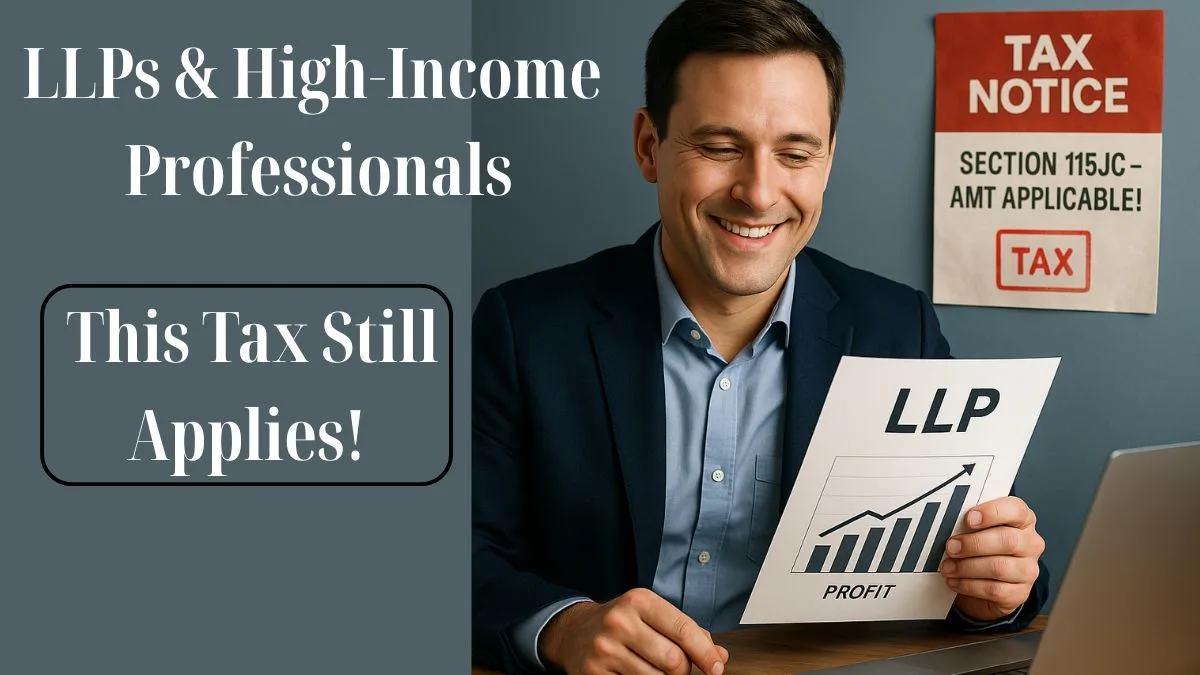
When you hear about Minimum Tax, the first thing that often comes to mind is MAT—Minimum Alternate Tax—applicable to companies. But did you know that even non-corporate taxpayers like LLPs, individuals, HUFs, & AOPs may also have to pay a similar tax?
That’s where Section 115JC of the Income Tax Act steps in. It introduces Special provisions for payment of tax by certain persons other than a company, ensuring that even entities availing heavy deductions or exemptions contribute a fair share of tax.
Let’s break it down in a simple & relatable way.
💡 What Is Section 115JC?
Section 115JC of the Income Tax Act deals with the Alternative Minimum Tax (AMT). It applies to all non-corporate taxpayers who claim deductions under Chapter VI-A (Part C) or Section 10AA.
In layman's terms, if you're an LLP or individual availing special deductions that reduce your taxable income significantly, the government still expects you to pay at least a minimum amount of tax.
Under this provision, tax is computed at 18.5% on adjusted total income instead of regular taxable income.
🔍 Who Is Covered?
Section 115JC applies to certain entities, including:
- LLPs (Limited Liability Partnerships)
- Individuals
- HUFs
- AOPs (Association of Persons)
- BOIs (Body of Individuals)
- Partnership firms (excluding companies)
Essentially, it applies to all assesses except companies.
But don’t worry—it only triggers if you are claiming deductions like:
- Section 10AA (SEZ units)
- Section 80H to 80RRB (excluding 80P)
📌 What Is Adjusted Total Income?
The AMT is not based on your regular taxable income. Instead, it’s based on something called Adjusted Total Income.
Here’s how it works:
Adjusted Total Income = Total Income Deductions claimed under 10AA & Chapter VI-A (Part C)
Then, the Alternate Minimum Tax = 18.5% of Adjusted Total Income
So, even if your taxable income was technically zero due to heavy deductions, you will still be liable to pay AMT on this adjusted figure.
📄 Mandatory Form: Report in Form 29C
If an assessee is liable to AMT, they must obtain a report in Form No. 29C from a Chartered Accountant.
This report should be furnished on or before the due date of filing income tax returns under Section 139(1). Failure to submit this report may lead to penalties & even loss of deduction benefits.
🧮 Example to Understand Better
Suppose you are an LLP earning ₹40 lakhs & claiming deductions of ₹15 lakhs under Section 10AA.
- Your taxable income = ₹25 lakhs
- But your Adjusted Total Income = ₹40 lakhs
- AMT = 18.5% of ₹40 lakhs = ₹7.4 lakhs
- If your regular tax is less than ₹7.4 lakhs, you will have to pay AMT instead
This ensures a minimum tax is collected despite high deductions.
🚫 Who Is Not Covered?
Not everyone is liable under this section. Individuals, HUFs, AOPs, & BOIs with Adjusted Total Income not exceeding ₹20,00,000 are exempt from AMT.
This limit is set to protect small taxpayers from the burden of alternative tax provisions.
📌 Summary of Key Features
- Section 115JC ensures that non-corporate taxpayers contribute a minimum amount of tax
- Special provisions for payment of tax by certain persons other than a company
- Applicable only when deductions under Section 10AA or Chapter VI-A (Part C) are claimed
- Tax is calculated at 18.5% on adjusted total income
- Mandatory Form 29C certification from CA
- Not applicable to taxpayers with adjusted income ≤ ₹20 lakhs
📈 Why Is It Important?
The main objective of Section 115JC is to prevent tax avoidance through excessive deductions. It encourages fair tax practices while still allowing businesses to claim legitimate incentives.
It also helps the government ensure consistent tax inflow from high-dedication entities that would otherwise contribute minimally.
📝 Final Thoughts
Section 115JC of the Income Tax Act plays a crucial role in ensuring equitable tax distribution among non-corporate taxpayers. It safeguards the spirit of tax reliefs without allowing complete exemption from contribution.
Whether you’re a professional running an LLP or a firm operating from an SEZ, this section directly affects how you plan your taxes.
Still confused about whether AMT applies to you? Let Callmyca.com handle your compliance professionally—because even “minimum tax” can become a major headache if ignored.











